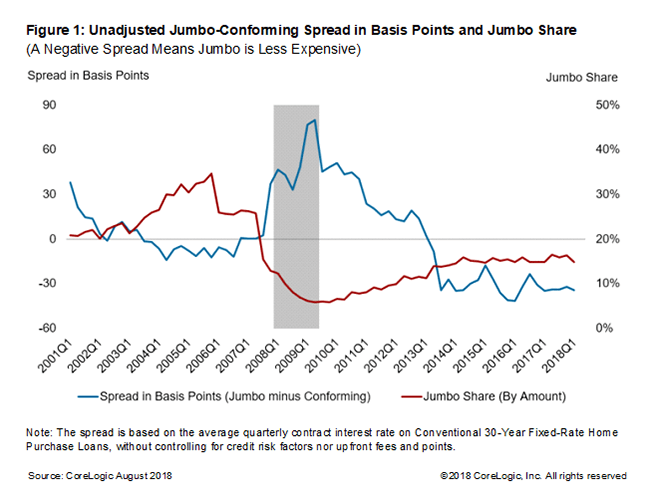Jumbo Loan: Competitive Prices and Flexible Terms for Pricey Characteristics
Jumbo Loan: Competitive Prices and Flexible Terms for Pricey Characteristics
Blog Article
Browsing the Jumbo Finance Landscape: Necessary Insights for First-Time Homebuyers
Navigating the complexities of big car loans offers a special set of difficulties for first-time buyers, particularly in a developing actual estate market. Comprehending the essential eligibility needs and prospective advantages, alongside the downsides, is essential for making educated decisions. Furthermore, developing a solid economic technique can substantially enhance your potential customers.
Recognizing Jumbo Fundings

Because big loans are not backed by government-sponsored entities, they lug various underwriting requirements and require even more thorough monetary paperwork. This distinction can lead to greater rate of interest contrasted to standard fundings, provided the increased threat to loan providers. Jumbo fundings likewise provide unique benefits, such as the ability to fund higher-value residential or commercial properties and possibly a lot more flexible terms.
Newbie homebuyers must also be mindful that securing a big funding frequently demands a larger down settlement, usually varying from 10% to 20%. Additionally, debtors are generally anticipated to show strong credit reliability and a stable revenue to certify. Comprehending these subtleties can empower newbie buyers to make informed choices when exploring jumbo finance options in their quest of homeownership.
Eligibility Demands
Safeguarding a jumbo car loan needs conference specific eligibility demands that vary substantially from those of standard financings. Unlike conventional fundings, which are often backed by government-sponsored entities, jumbo car loans are not guaranteed or assured, resulting in stricter criteria.
Additionally, borrowers have to show a robust financial account, which consists of a low debt-to-income (DTI) proportion, usually no greater than 43%. This guarantees that borrowers can handle their regular monthly repayments alongside various other monetary obligations.
In addition, the majority of loan providers require significant paperwork, including evidence of income, property statements, and tax obligation returns for the previous two years. A substantial down payment is additionally crucial; while traditional lendings might enable down payments as reduced as 3%, jumbo finances typically necessitate at least 20%, depending on the loan provider and the funding amount.

Benefits of Jumbo Finances
For several first-time buyers, jumbo fundings offer unique advantages that can assist in the trip toward homeownership. Among the main benefits is the ability to finance properties that surpass the adjusting loan limits established by government-sponsored entities. This adaptability allows buyers to access a broader variety of high-value properties in competitive realty markets.
Additionally, jumbo finances typically come with attractive rate of interest that can be lower than those of conventional car loans, especially for customers with strong credit rating accounts. This can lead to considerable savings over the life of the loan, making homeownership extra affordable. In addition, big car loans generally enable greater car loan quantities without the demand for personal mortgage insurance policy (PMI), which can even more reduce regular monthly payments and total costs.

Prospective Disadvantages
Lots of prospective property buyers may find that jumbo lendings come with significant drawbacks that require mindful factor to consider. Among the main worries is the strict qualification criteria. Unlike conforming lendings, big financings commonly need higher credit rating, frequently exceeding 700, and significant earnings documentation, making them much less easily accessible for some customers.
In addition, jumbo lendings generally include higher passion rates contrasted to traditional car loans, which can lead to raised regular monthly payments and general borrowing prices. This premium might be specifically burdensome for new property buyers that are already browsing the financial intricacies of purchasing a home.
An additional noteworthy downside is the larger deposit requirement. Numerous loan providers expect a minimum deposit of 20% or even more, which can pose an obstacle for buyers with minimal savings. The lack of federal government support for big loans leads to much less favorable terms and conditions, boosting the threat for lenders and, consequently, the borrowing expenses for home owners.
Lastly, market fluctuations can substantially influence the resale worth of premium residential properties funded with jumbo car loans, adding an aspect of monetary changability that new buyers might locate challenging.
Tips for First-Time Homebuyers
Navigating the complexities of the homebuying process can be overwhelming for newbie purchasers, especially when taking into consideration big loans (jumbo loan). To simplify this trip, sticking to some vital approaches can make a substantial distinction
First, enlighten on your own on jumbo financings and their specific needs. Recognize the various loaning requirements, including credit report, debt-to-income proportions, and deposit expectations. Generally, a minimum credit rating of 700 and a deposit of a minimum of 20% are crucial for authorization.
Second, engage with an educated home mortgage expert. They can offer insights customized to your monetary situation and help you browse the ins and outs of the big loan landscape.
Third, consider pre-approval to strengthen your investing in placement. A pre-approval letter signals to sellers that you are a severe customer, which can be helpful in affordable markets.
Lastly, do not forget the relevance of budgeting. Consider all check my reference expenses connected with homeownership, including residential or commercial property taxes, maintenance, and property owners' insurance coverage. By complying with these suggestions, novice buyers can approach the jumbo loan procedure with better self-confidence and clearness, improving their chances of successful homeownership.
Verdict
In verdict, navigating the big funding landscape requires a detailed understanding of eligibility requirements, advantages, and prospective downsides. Ultimately, detailed preparation and education and learning regarding big finances can lead to more educated decision-making in the homebuying procedure.
When navigating the intricacies of the real estate market, understanding jumbo loans is important for new homebuyers aiming for residential or commercial properties that surpass standard lending limitations. Big loans are non-conforming fundings that commonly exceed the adhering finance restriction set by the Visit Website Federal Housing Financing Company (FHFA)In addition, big loans typically come with appealing passion prices that can be reduced than those of traditional car loans, particularly for debtors with solid credit profiles. Jumbo lendings usually enable for higher car loan amounts without the requirement for personal home loan insurance coverage (PMI), which can additionally minimize total expenses and regular monthly repayments.
Unlike adapting financings, big financings commonly call for greater debt ratings, commonly surpassing 700, and considerable income documentation, making them much less easily accessible for some customers.
Report this page